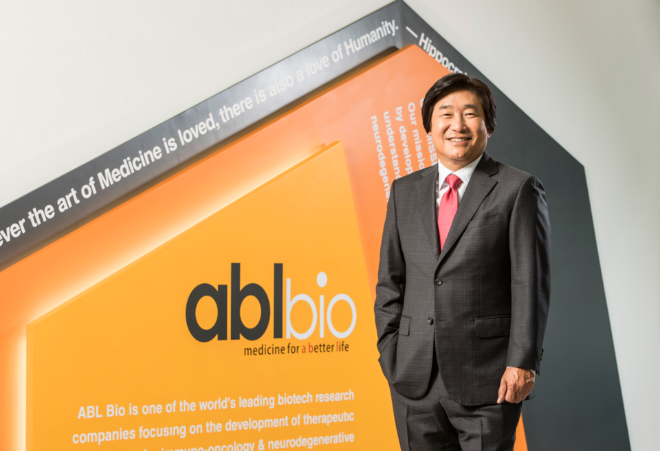 이미지 확대보기
이미지 확대보기According to industry sources on April 15, ABL Bio signed a licensing agreement on the 7th with UK-based global pharmaceutical giant GlaxoSmithKline (GSK), transferring Grabody-B in a deal worth GBP 2.14 billion (approximately KRW 4.1 trillion). This marks the second-largest licensing-out agreement ever by a Korean biotech firm, following Alteogen’s KRW 4.7 trillion deal with Merck in 2020.
Under the deal, ABL Bio will receive GBP 77.1 million (approximately KRW 148.1 billion) in non-refundable upfront and short-term milestone payments. The upfront payment alone amounts to GBP 38.5 million (KRW 73.9 billion). Additional milestone payments of up to GBP 2.063 billion (KRW 3.9623 trillion) are contingent upon clinical trials, regulatory approval, and commercialization. ABL Bio will also receive royalties based on net sales.
Notably, this is a platform deal, not one involving a specific candidate molecule. Back in 2022, ABL Bio licensed a candidate developed using Grabody-B to Sanofi of France for USD 1.06 billion (approximately KRW 1.272 trillion). Despite platform deals typically being smaller than candidate-specific ones, ABL Bio has now secured a deal larger than its previous one with Sanofi.
This LO is expected to help ABL Bio escape the string of losses it has suffered since 2023. That year, the company posted KRW 63.6 billion in revenue and KRW 2.6 billion in operating loss on a consolidated basis. In 2024, revenue fell to KRW 33.4 billion, with operating losses widening to KRW 59.4 billion.
However, with the upfront and near-term milestone payments from GSK, ABL Bio is expected to quickly cover its losses. As of the end of last year, the upfront payment alone would boost the company’s liquidity by more than KRW 210 billion.
Notably, ABL Bio will bear virtually no R&D expenses under this licensing agreement. GSK will be responsible for all stages from preclinical to clinical development, manufacturing, and commercialization. ABL Bio will transfer the related technology and know-how for Grabody-B.
The company’s confidence in securing additional contracts stems from the scalability of Grabody-B. The platform is highly versatile, potentially applicable not only to antibodies but also to gene therapies and other modalities.
For this reason, GSK had initially sought to apply Grabody-B to various modalities, including siRNA (small interfering RNA). However, after negotiations, ABL Bio excluded amyloid beta and tau proteins from the exclusive license scope. This means ABL Bio retains the right to pursue separate deals targeting those proteins with other global pharmaceutical companies. Amyloid beta and tau proteins are known as key targets for Alzheimer’s treatment.
ABL Bio CEO Lee Sang-hoon stated, “The contract with GSK was concluded just three months after meetings at the J.P. Morgan Healthcare Conference earlier this year,” and added, “Regarding amyloid beta and tau, which are major Alzheimer’s targets, the agreement is non-exclusive based on epitopes.”
He also said, “Future deals can be executed even without a material transfer agreement (MTA),” expressing confidence that “additional licensing-out agreements will be signed later this year.”
Kim Nayoung, Korea Finacial Times (steaming@fntimes.com)
[관련기사]
- Intensified Competition, Trump Risk, and Oversupply... Samsung Biologics CEO John Rim Faces Mounting Challenges Amid Uncertainty
- John Rim’s 4 Years That Changed the Bio Landscape: From Latecomer to ‘Samsung’s Savior’
- Last Year’s Jackpot, Pharma Firms Bet Everything on the Next Blockbuster Drug
- Pharmaceutical DNA in Kolmar Korea and COSMAX... True Commitment to R&D
- Yuhan Corporation Becomes First Korean Pharma to Join the '2 Trillion Won Club'—Will There Be a 'Next Leclaza' This Year?
- K-PharmaBio’s First 'KRW 4 Trillion Club' Member – Samsung Biologics Eyes KRW 5 Trillion with Unmatched Excellence in Capacity
가장 핫한 경제 소식! 한국금융신문의 ‘추천뉴스’를 받아보세요~
데일리 금융경제뉴스 Copyright ⓒ 한국금융신문 & FNTIMES.com
저작권법에 의거 상업적 목적의 무단 전재, 복사, 배포 금지












!['From Heavy Industry to Humanoids' — Doosan Robotics Charts a New Future in Physical AI [K-Humanoid Wars, Part 3]](https://cfnimage.commutil.kr/phpwas/restmb_setimgmake.php?pp=006&w=284&h=214&m=5&simg=2026030310061306979141825007d12411124362.jpg&nmt=18)


!['Samsung's Bet on the Future' — Rainbow Robotics, Korea's Humanoid Pioneer [K-Humanoid Wars, Part 2]](https://cfnimage.commutil.kr/phpwas/restmb_setimgmake.php?pp=006&w=284&h=214&m=5&simg=2026022413501808272141825007d12411124362.jpg&nmt=18)
![Tesla's Humanoid Rival Has Arrived — Boston Dynamics Eyes $70 Billion Valuation [K-Humanoid Wars, Part 1]](https://cfnimage.commutil.kr/phpwas/restmb_setimgmake.php?pp=006&w=284&h=214&m=5&simg=2026022010243207659141825007d12411124362.jpg&nmt=18)

![Samsung's 'Last Chance': Lee Jae-yong Pushes HBM4 as Make-or-Break Moment [KFT Topic]](https://cfnimage.commutil.kr/phpwas/restmb_setimgmake.php?pp=006&w=284&h=214&m=5&simg=2026012623242806011141825007d122461258.jpg&nmt=18)
![Tesla's Humanoid Rival Has Arrived — Boston Dynamics Eyes $70 Billion Valuation [K-Humanoid Wars, Part 1]](https://cfnimage.commutil.kr/phpwas/restmb_setimgmake.php?pp=006&w=110&h=79&m=5&simg=2026022010243207659141825007d12411124362.jpg&nmt=18)

!['Samsung's Bet on the Future' — Rainbow Robotics, Korea's Humanoid Pioneer [K-Humanoid Wars, Part 2]](https://cfnimage.commutil.kr/phpwas/restmb_setimgmake.php?pp=006&w=110&h=79&m=5&simg=2026022413501808272141825007d12411124362.jpg&nmt=18)

